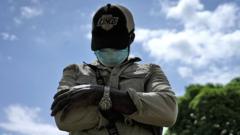In a revealing interview with the BBC, a Ghanaian man, referred to as James, recounts his terrifying experience after being kidnapped by jihadists in Burkina Faso. After observing the militant camp's structure, recruitment tactics, and ideology, he offers a unique perspective on the insurgency plaguing West Africa and the challenges Ghana faces amidst growing threats from such groups.
Insights Into the Jihadist Life: A Ghanaian Captive's Experience

Insights Into the Jihadist Life: A Ghanaian Captive's Experience
A Ghanaian man's harrowing account of his abduction by jihadists in Burkina Faso sheds light on the inner workings of militant groups in West Africa.
In a chilling testimony shared with the BBC, a Ghanaian man, who we will call James, recounts his traumatic abduction by jihadists in Burkina Faso, providing an unprecedented glimpse into their operations. Captured at gunpoint during a journey to Senegal, James was taken to a desert camp where he experienced a world driven by violence and indoctrination.
Reflecting on his initial days in captivity, James described feeling terrified as he witnessed armed fighters return from missions, firing their weapons wildly. He admitted that the fear made him momentarily lose control, illustrating the psychological toll of such experiences. The insurgents, part of the Jama'at Nusrat al-Islam wal-Muslimin (JNIM) affiliated with al-Qaeda, tried to recruit him by offering an enticing role as a battalion commander, leveraging promises of power and safety.
James remained under the jihadists' custody for two weeks before he engineered his release by fabricating a story about the illness of his child. He pledged to act as a recruiter for their cause back in Ghana, a promise he never intended to fulfill. After his release, he returned home to a more stable Ghana, which, unlike its neighbors, has largely maintained peace amid a regional surge in Islamist violence.
Ghana's situation is precarious as it shares a porous border with Burkina Faso, which is besieged by jihadist activities. There are growing concerns over the spillover of violence into Ghana, as more than 15,000 refugees have crossed into the country to escape the conflict. The Ghanaian government has initiated various measures to bolster security, including engaging the community in awareness campaigns against radicalization.
Through James's account, a disturbing picture of life in a jihadist camp emerges. He described the camp's structure, the division of captured women and children, and the indoctrination methods used to recruit young fighters. He detailed chilling scenes of children, some indoctrinated to become suicide bombers, demonstrating the terrifying reality of recruitment strategies aimed at deepening the insurgency.
Analyzing this aspect of modern warfare, observers note how criminal motives masquerade under political rhetoric as jihadists invoke names of African revolutionary leaders. James reported that the insurgents spoke of liberation and anti-colonial sentiments, aiming to attract recruits through a sense of historical and cultural identity, plunging them into a spiral of violence.
As the dynamics of the Sahel region continue to evolve, so does Ghana's commitment to safeguarding its borders. The government recognizes the need to enhance military readiness and community engagement to deter the ever-present threat of jihadism. However, experts argue for addressing the underlying socio-economic issues that fuel extremism.
In conclusion, James's tale not only sheds light on the brutal realities of jihadist camps but also serves as a crucial reminder of the challenges that nations like Ghana face in navigating the complexities of regional security threats tied to insurgency and cultural dimensions. His ordeal underscores the urgent need for comprehensive solutions as the insurgency in West Africa becomes an escalating concern.




















